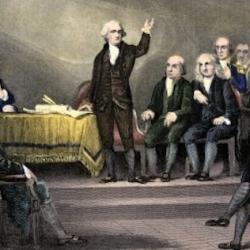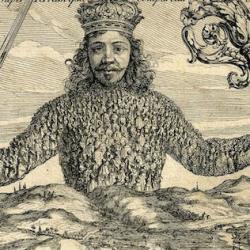In a lively exchange with Eugene McCarraher, John Milbank summarizes his views on democracy. Like Chesterton, he is a defender of the democracy of the dead, and he insists that this is not simply “a defense of the given and an assault on the present.”
That is, he claims, “primarily because we never live in the present, but always in the continuous passage from the past to the future. Thus any revolutionary claim, like that of Paine, to represent only the present, must dogmatically and undemocratically freeze an imaginary synchronisation of time.” Some have attempted to escape this result, but the human cost is high: “permanent and terroristic ‘Maoist’ revolution as every present had to overthrow the previous moment, with ever-mounting delirium and hysteria.” Pure “presentism” losts the future as well as the past: It “will tend both to foreclose the future, that always emerges from continuing past tradition, and to deny the authenticity of un-voted-for traditions that persist into the present.”
He denies McCarraher’s charge that he is advocates aristocratic domination. But he goes on to argue that “representative democracy” is a “misnomer.” Early advocates of representative government were actually advocates of a form of mixed government, which, he argues, is inescapable in any case:
“Democracy means mainly direct, participatory democracy, and I am so far from being haughtily opposed to it that I even regard it as paradigmatic and wish to extend it as far as possible. But in any reasonably extended and complex polity, the interplay of the one, the few and the many is less a Classical recommendation than always a description of actual reality. In some sense, there must be the consent (voluntary or forced) of the many for the working of a viable polity. In addition there will be the role of (an often highly fluid and recomposable) few, whether as prior ‘proposers’ or as subsequent ‘representatives.’ Then there will be the executive One (monarch, president, first minister, symbolic ultimate power, etc.) where the buck always stops and without which there does not seem to be, so far, any possibility of drawing a political circumference.”
Milbank is happy for proposals to “emerge spontaneously from the people themselves en masse,” but observes this is rare and argues that it is not always desirable: “We need the influence of the more inspired, creative, gifted, generous, detached and virtuous wherever they are found throughout society.” That implies, of course, that there are some who are more inspired, creative, gifted, etc. The “few” shouldn’t be “a circumscribed political class,” but such a class always plays a role in any complex political order.
Milbank argues that, far from protecting the people from the influence of wealthy oligarchs, pure democracy facilitates corruption: “where such a variegated class is seen as entirely subordinate to democratic opinion, whatever it may be, or as ‘representative’ is regarded as being in some way mandated, then first one gets the substitution of monetary influence, bad corporatist lobbying, spin, second-guessing populism and manipulation of opinion for wise guidance, and second one gets the substitution of the representing class for the supposedly exhaustively and adequately represented.” Without an acknowledge role for the few, there is “less democracy and above all less latitude for regions of informal, spontaneous and participatory democracy.”
On the other hand, “where the ‘aristocratic’ function is directly acknowledged as irreducible, and no spurious claims to pure democracy or even the ultimacy of democracy as a value . . . are made, then in reality more democracy will be exercised. For one thing, more space will be left to informal self-management and to ‘latent’ forces and potentials. For a second, people will be offered more educated, nuanced and responsible options. For a third, representatives reflecting and acting according to their own views will be all the more also inclined to consider and not take for granted the symbolic resonance of their own positions with those of the many whom they represent and will tend to search for substantive horizons of agreement as to the nature of true human flourishing.”
Milbank admits that he has stressed the role of “aristocratic,” but that is because “liberalism tends definitionally to remove its operation” as a mediator between the one and the man. The mediating role is a “modest” role, “sometimes to be trumped by personal executive decision from above and always to be tested by the many whose acceptance should finally prevail and must of actual necessity do so.”















